 CLOUD
CLOUD
 CLOUD
CLOUD
 CLOUD
CLOUD
Business operations can’t work effectively if the in-house tech team doesn’t remain up-to-date on platforms and systems. Dell EMC is working to ensure organizations receive the right training through certifications designed to provide current education on the latest technology and operating systems.
“The Dell Technologies Proven Professional program has been in place for years,” said Mike Apigian (pictured), senior director of education services product management at Dell EMC. “A lot of industry-recognized certifications … focused on storage, data protection, product-related. And over the past 12 months to 18 months, we’ve actually got a lot of expansion beyond that into more areas of transformation. And those areas where we’ve expanded beyond just products have been tied back right to the skills gaps that we’re seeing in customers.”
Apigian spoke with Lisa Martin (@LisaMartinTV) and Stu Miniman (@stu), co-hosts of theCUBE, SiliconANGLE Media’s mobile livestreaming studio, during the Dell Technologies World event in Las Vegas. They discussed the kind of technological training Dell EMC offers, what skills Dell customers are looking to gain, and how those skills can transform and enhance company performance (see the full interview with transcript here). (* Disclosure below.)
[Editor’s note: The following answers have been condensed for clarity.]
Miniman: We’ve talked about what used to be EMC and what’s now Dell EMC Education Service. We’ve talked about storage certification to converge certification to cloud certification, so what’s the latest and greatest? What is the go-to skillset that people need and the ones that people are calling up and saying, “If I could learn this, it’s going to catapult my career?”
Apigian: Some examples include more of a focus on converged infrastructure and hybrid cloud. We have some associate-level certifications we recently brought to market. Multicloud, that’s a big focus for us. We have some expert-level certifications in place focused on that. We also have a focus around security and designing infrastructure with that security-first mindset. And then, finally, the other most recent transformational type of certification is master level. Think of a career pinnacle-level certification that’s focused on transformational architecture.
Miniman: What works today, and where do we need to go as an industry to try and help users live in a multicloud world that we’re already in but struggling with?
Apigian: There’s a ton of proficiency in the silos and in managing specific infrastructure service storage networks around converged infrastructure, as well as cloud deployments, but to your point, in a multi-cloud environment, there are different providers. Different technologies, and it can get complex. Having the skill sets to take a step back and look at that holistically and understand about workload placement; there’s knowledge and skill sets that require us to make some of those determinations.
We have a lot of service capabilities that help provide that, but there’s a level of proficiency that our customers want and need in-house. A lot of it is building that knowledge and understanding the decision points and the criteria for the different providers, as well as workload placement and movement across a multicloud environment.
Martin: There are a lot of benefits for the individuals going through the training in terms of upscaling and job retention. Do you have a favorite example of a customer who’s really been able to transform their company because they’ve made this investment and are ensuring that their talent has the latest and greatest education?
Apigian: We’ve done a bunch of research, and what we see is a strong correlation between those organizations that are focusing on and investing in their people and the skills development — a correlation between that and the progress and success that they’re having with their transformation initiatives. And one area where we’ve been engaging a lot deeper with customers is what we call an organizational learning program.
We obviously offer technical training and certifications, but this is more of a consultative engagement with our customers at the organization level, and we work closely with them to understand their digital strategies and plans, and as part of that, drive an assessment of what’s going on in their environment from a people and skills perspective.
Really understanding their current state and where they want to go, where they need to be, and based upon the findings of that assessment, we work closely with them to develop a defined documented strategy and plan. In this case, it’s a learning plan. It’s a continuous learning plan for an organization over a series of quarters to really gain the skills and knowledge required to help move them forward.
Watch the complete video interview below, and be sure to check out more of SiliconANGLE’s and theCUBE’s coverage of the Dell Technologies World 2019 event. (* Disclosure: Dell Technologies Inc. sponsored this segment of theCUBE. Neither Dell nor other sponsors have editorial control over content on theCUBE or SiliconANGLE.)
THANK YOU